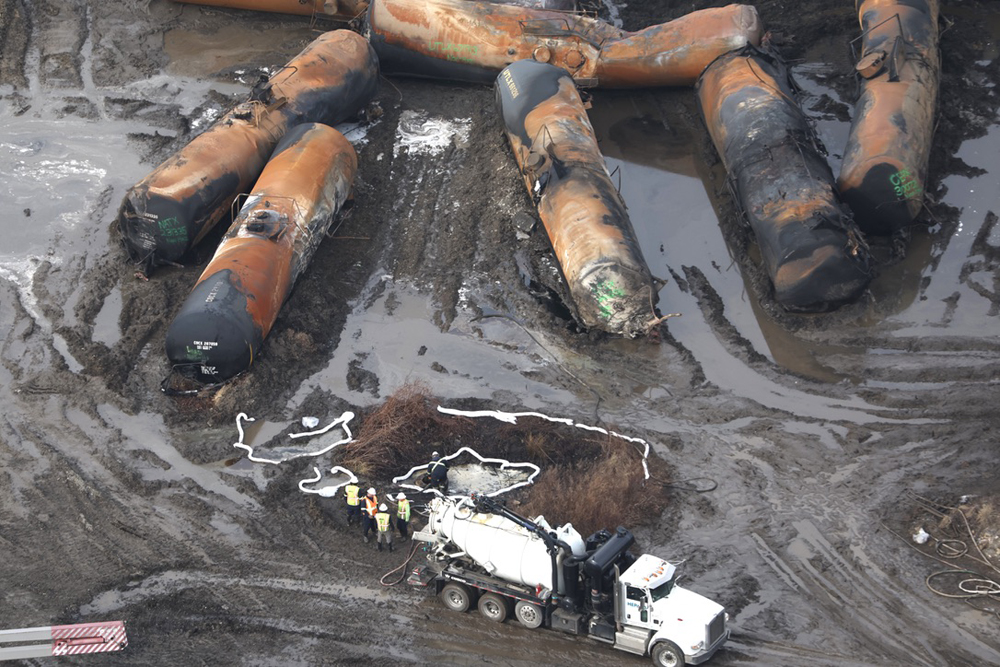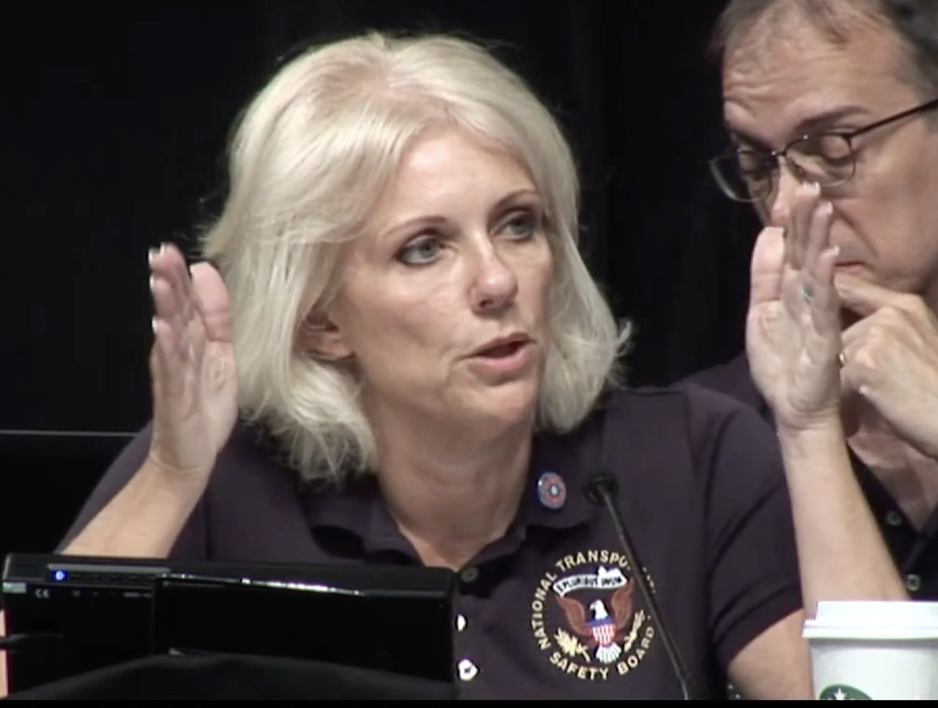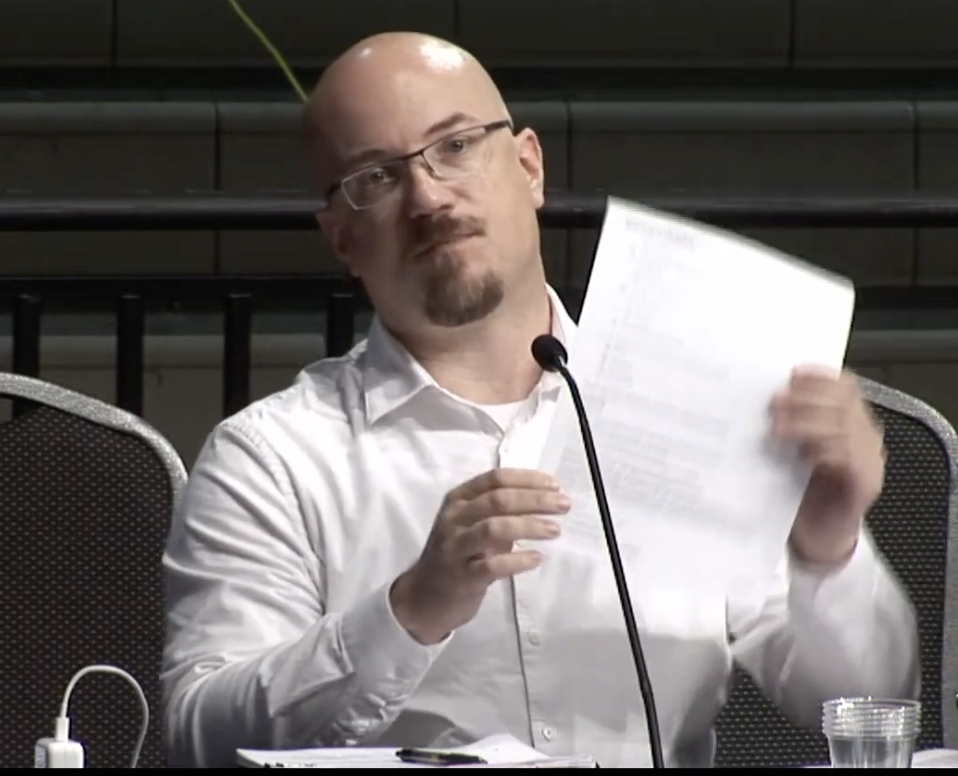Top 10 stories of 2023, No. 1: East Palestine
Norfolk Southern’s disastrous hazardous materials wreck in East Palestine, Ohio — which put the railroad industry’s safety record under a withering spotlight — is Trains News Wire’s top story for 2023.
The Feb. 3 derailment near the Ohio-Pennsylvania border likely was caused by the catastrophic failure of a wheel bearing on a covered hopper carrying plastic pellets. It was the 23rd car in the 149-car train 32N, according to the National Transportation Safety Board. Thirty-seven other cars subsequently derailed, some of which caught fire.
First responders put out the resulting blaze by Feb. 5, but five derailed DOT-105 tank cars carrying 115,580 gallons of vinyl chloride concerned authorities because the temperature inside one of the cars was still rising after flames had been extinguished.
“This increase in temperature suggested that the vinyl chloride was undergoing a polymerization reaction, which could pose an explosion hazard. Responders scheduled a controlled venting of the five vinyl chloride tank cars to release and burn the vinyl chloride, expanded the evacuation zone to a 1-mile by 2-mile area, and dug ditches to contain released vinyl chloride liquid while it vaporized and burned,” the NTSB said. “The controlled venting began about 4:40 p.m. on Feb. 6 and continued for several hours.”

The venting sent a huge column of black smoke billowing into the sky. It became the iconic image of the disaster that contaminated soil and nearby waterways and left residents fearful and complaining of various health ailments. The derailment, environmental cleanup, legal costs, and reimbursements to area residents and businesses totalled $966 million through the third quarter, NS says.
The cost to the industry’s reputation has been incalculable. The derailment, and subsequent wrecks on NS and other railroads, attracted the attention of national media and put railroads on the front pages of major newspapers.
NS CEO Alan Shaw appeared on several national television news broadcasts and was grilled at a March 9 Senate committee hearing. All along Shaw has said that NS is committed to doing what’s right for East Palestine and the surrounding communities to ensure the area recovers and thrives — now and in the years to come. The railroad has spent $103.2 million in the community to date and has set up long-term funds to monitor drinking water, residents’ health, and to backstop residential home values. It also has funded economic development efforts, park improvements, and scholarships for area students.
“I hope that whatever’s written about this years down the road, they’re going to say NS stayed true to form,” Shaw told Trains in an April interview. “We did exactly what we said we were going to do: We’re going to make it right and we’re going to be focused on the long term instead of the short term.”
NS hired an independent safety consultant to examine its safety culture and make recommendations, which NS has made public. Shaw says the railroad will become the “gold standard” for safety.

The NTSB held a rare two-day field hearing in East Palestine. The agency says its ongoing investigation will focus on the wheelset and bearing that failed; tank car design and derailment damage; a review of the accident response, including the venting and burning of the vinyl chloride; railcar design and maintenance procedures and practices; NS use of wayside defect detectors; and NS railcar inspection practices.
The Senate’s bipartisan Rail Safety Act, introduced by Ohio Sens. J.D. Vance and Sherrod Brown, would regulate wayside defect detectors for the first time, expand handling rules for trains carrying hazardous materials, and require railroads to provide first responders with more funding and real-time data on hazmat shipments. The bill also would require a train crew of at least two people, cap train length and weight, set minimum times for freight car inspections, outlaw blocked grade crossings, and increase fines on railroads that violate safety rules. With some members of Congress urging fellow lawmakers to await the NTSB report, the bill has not made it to the Senate floor for a vote.
But the Federal Railroad Administration stepped up its inspections and conducted an in-depth review of the safety culture at NS. Railroads also began sharing best practices about hot bearing detector temperature thresholds and trend analysis, among other things.

Rail labor took advantage of the wreck to air grievances over massive job reductions that since 2017 have accompanied the spread of Precision Scheduled Railroading. Safety, the unions claim, has taken a back seat to cutting costs and boosting profits at the U.S. Class I railroads.
The industry says its safety record speaks for itself: Derailments and employee injuries are down over the long term, and shipping freight by rail is much safer than by truck.
“Since we implemented PSR — and we did it the NS way — last year our derailments were the lowest in the last two decades. We can do better,” Shaw says. “Last year our employee injury rate was the lowest it’s been in the last decade. We can do better. As you know, on my first day as CEO last year – which seems like eons ago – I was out in the field on a Sunday with my craft colleagues, thanking them for what they do for NS and our customers and the U.S. economy. That’s the importance I place on our craft colleagues. Since I’ve become CEO we’ve been on a hiring spree. I’m investing in our craft colleagues.”
Previous News Wire coverage:
“Norfolk Southern derailment in Ohio continues to burn,” Feb. 4, 2023.
“Ohio governor issues new evacuation order for East Palestine, warning of possible tank car explosion,” Feb. 5, 2023.
“Controlled release of chemicals at derailment successfully completed, NS says,” Feb. 6, 2023.
“Evacuation order lifted in East Palestine, Ohio,” Feb. 8, 2023.
“Senators propose tighter regulations for railroad hazmat shipments,” March 1, 2023.
“Class I railroads announce new hot bearing safety measures in wake of East Palestine derailment,” March 8, 2023.
“Senate committee grills Norfolk Southern CEO about East Palestine derailment,” March 9, 2023.
“East Palestine has put railroads under a cloud of suspicion: Analysis,” April 7, 2023.
“Norfolk Southern CEO talks East Palestine, rail safety, long trains, and the importance of taking a long-term view,” April 27, 2023.
“NTSB hearing on East Palestine derailment begins with look at first-responder concerns,” June 22, 2023.
“NTSB East Palestine hearing centers on decision to vent and burn tank cars of vinyl chloride,” June 23, 2023.
“NTSB East Palestine hearing focuses on role of car inspection, wayside detectors,” June 24, 2023.
“FRA report: Norfolk Southern safety improving, but gaps remain,” Aug. 9, 2023.
“Safety consultant identifies ways Norfolk Southern can improve,” Sept. 14, 2023.
“Norfolk Southern earnings take hit from East Palestine, volume decline, and higher costs,” Oct. 25, 2023.
Norfolk Southern concludes removal of contaminated soil from East Palestine,” Oct. 31, 2023.
